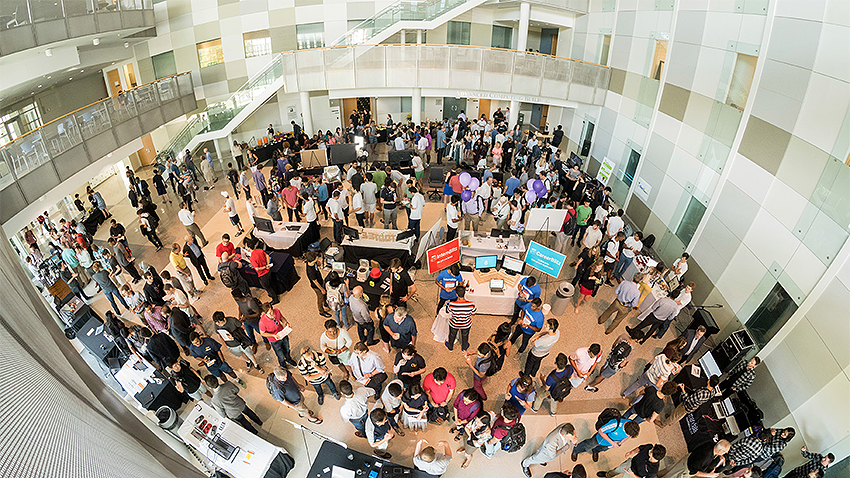Upcoming Events
Georgia Tech Workshop on Foundation of Scientific AI for Optimization of Complex Systems

January 16th, 2024 at Georgia Tech, CODA building 13th floor.
Brief Description This one-day workshop will be held at Georgia Tech on January 16th, 2024 and convene experts in computational mathematics, statistics, data science, and application domain scientists across science and engineering to address the foundational topics of scientific AI for the prediction and optimization of complex systems (such as electromagnetic, corrosion science). The agenda emphasizes transcending conventional forward simulations and predictions to realize the optimization of complex systems at a large scale by harnessing the power of scientific AI.
Schedule
Session 1
- 8:45 AM - 9:00 AM: opening remarks by Srinivas Aluru & Haesun Park
- 9:00 AM - 9:35 AM: Prasanna Balaprakash, ORNL (30 mins + 5 mins Q&A)
- 9:35 AM - 10:00 AM: Raphaël Pestourie, GT CSE (20 mins + 5 mins Q&A)
- 10:00 AM - 10:25 AM: Peng Chen, GT CSE (20 mins + 5 mins Q&A)
Morning Break 10:25 AM - 10:45 AM(20 mins)
Session 2
- 10:45 AM - 11:20 AM: Bart van Bloemen Waander, Sandia (30 mins + 5 mins Q&A)
- 11:20 AM - 11:45 AM: Ebeneser Fanijo, GT BC (20 mins + 5 mins Q&A)
- 11:45 AM - 12:10 PM: Yan Wang, GT MechE (20 mins + 5 mins Q&A)
Lunch Break and Networking 12:10 PM - 1:10 PM (60 mins)
Session 3
- 1:10 PM - 1:45 PM: Aditi Krishnapriyan, UC Berkeley (30 mins + 5 mins Q&A)
- 1:45 PM - 2:10 PM: Bo Zhu, GT IC (20 mins + 5 mins Q&A)
- 2:10 PM - 2:35 PM: Bolei Deng, AE (20 mins + 5 mins Q&A)
Afternoon Break 2:35 PM - 2:55 PM (20 mins)
Session 4
- 2:55 PM - 3:30 PM: Guannan Zhang, ORNL (30 mins + 5 mins Q&A)
- 3:30 PM - 3:55 PM: Lars Ruthotto, Emory Math (20 mins + 5 mins Q&A)
- 3:55 PM - 4:20 PM: Haomin Zhou, GT Math (20 mins + 5 mins Q&A)
Panel Discussion and closing
- 4:20 PM - 5:20 PM: Panel Discussion with Selected Speakers (60 mins)
Workshop Details
Complex systems are prevalent in a wide range of scientific and engineering disciplines. These systems incorporate numerous variables, some of which are controllable, some are subject to design specifications, and others may be latent or determined by either identified or unidentified processes. Accurate prediction of the system response is intrinsically difficult, yet often secondary to more pressing engineering concerns regarding optimal design or control of the system. For instance, in the realm of electromagnetic (EM) devices, advancements in fabrication technologies have afforded extensive design and control freedoms, such as metamaterials and 4D materials. These developments have rendered simulation and optimization as the limiting factors for inverse design or control applications. In the context of corrosion science, the corrosion initiation of metals is governed by dynamic and complex processes that take place at multi-scale levels. As such, investigation of its kinetic dissolution with just macroscopic, or bulk, electrochemical techniques or sometimes with high resolution microscopy poses considerable challenges. Scientific AI offers a viable avenue for the rapid and reliable prediction and discovery during the initiation and propagation of metallic corrosion. The intersection of scientific AI and complex systems engenders a host of unresolved questions, including efficient simulation strategies, model parameterization, the integration of domain-specific knowledge or system architecture, and the role of AI in scientific computing for predictive and optimization purposes.
The methodologies of Scientific AI utilize the robust nonlinear fitting capabilities of deep learning to enhance the predictive efficiency and accuracy of conventional scientific computing and statistical methods for the simulation of complex systems. This workshop aims to explore how scientific AI employs domain-specific knowledge and scientific computational techniques to improve the accuracy and efficiency of the optimization of complex systems. It is essential to note that a scientific AI model proficient in making accurate predictions is not invariably well-suited for optimization tasks. Therefore, this workshop will concentrate on approaches that facilitate effective optimization performance of scientific AI, whether through gradient-based optimization techniques or alternative strategies, contributing to groundbreaking scientific and engineering discoveries through optimization.
Organizers: Raphaël Pestourie, Peng Chen, Ebeneser Fanijo, Yan Wang
Event Details
Media Contact
School of CSE Assistant Professor Raphaël Pestourie
rpestourie3@gatech.edu
EVENTS BY SCHOOL & CENTER
School of Computational Science and Engineering
School of Interactive Computing
School of Cybersecurity and Privacy
Algorithms and Randomness Center (ARC)
Center for 21st Century Universities (C21U)
Center for Deliberate Innovation (CDI)
Center for Experimental Research in Computer Systems (CERCS)
Center for Research into Novel Computing Hierarchies (CRNCH)
Constellations Center for Equity in Computing
Institute for People and Technology (IPAT)
Institute for Robotics and Intelligent Machines (IRIM)